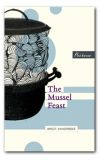
15 Feb 2013 04:08:21
Like all Peirene books, Venderbeke's is brief, in this case just breaking the 100-page barrier. I gather that its British publisher was surprised to find it had not already been translated, which shows a rather touching faith in this nation's curiosity about European fiction. But you may wonder why it is a set text in Germany. Something funny is going on here, but what?
"Although I found the mussels creepy" – the book is narrated by the elder daughter – "I went over, as I didn't want to be cowardly; and they looked revolting, lying there, some opening slowly, fairly slowly, and then the entire heap of them started to move with this rattling sound. Unbelievable, I said, how revolting these creatures are, gasping as instead of seawater they get air, which they can't breathe, and they're also being scalded in the boiling water, and then they all open, which means they're dead."
I was reminded of another scene where a German is revolted by seafood: the eels in Gunter Grass's The Tin Drum. The daughter recalls much nausea from her childhood: continually puking up her formula as a baby, puking up in the car when her father was driving. There is an undercurrent of revulsion beneath the otherwise placid exterior of the postwar German family. This family, though, like Vanderbeke's, originally came from the GDR; and many see the book as a deep criticism of – take your pick – either the stifling, unimaginative conformity of the west, or the tyranny, and indeed stifling, etc etc of the East. A teasing author's quote on the back jacket reads: "I wrote this book in August 1989, just before the fall of the Berlin Wall. I wanted to understand how revolutions start. It seemed logical to use the figure of a tyrannical father and turn the story into a German family saga."
While it's good to know that there is a reason why the needle on your metaphor-detector is trembling, it's also good to know that – unlike, say, Animal Farm – the book is not all metaphor, with everything in it capable of being neatly paired off with its real-life counterpart. The word that alerted me was "logical", which is itself a quality the scientifically minded father prizes highly. It may be that this is a portrait of the hysteria behind the calm, progressively technocratic Wirtschaftswunder [economic miracle] (as the father reminds his children many times, playing the piano and reading books don't get engines started); but there is real, felt horror at what we gradually learn is the monstrous, deranged behaviour of the father. Both the children, it turns out, have wondered how many bones they would break if they jumped from their first-floor balcony; but the windows are locked, so the neighbours won't hear the sound of the father's fury. (Pretty much everything drives him round the bend.) The mother, in turn, fantasises about Medea, and when her admission comes it is almost as terrifying as Medea's actual crime.
This is one of those books that doesn't tell us what to think, but sets us off thinking, which really is the way to do it. (That it was Vanderbeke's first published work I find remarkable.) And if this is, as has been claimed, a look into the German psyche, then perhaps we wouldn't see that nation in the chippy or resentful way we sometimes now do. Who writes this kind of nuanced work in Britain?

